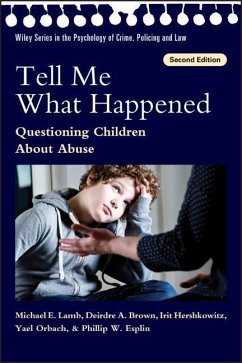Michael E. Lamb (University of Utah), Deirdre A. Brown, Irit Hershkowitz (University Of Haifa)
Tell Me What Happened
Questioning Children About Abuse
Michael E. Lamb (University of Utah), Deirdre A. Brown, Irit Hershkowitz (University Of Haifa)
Tell Me What Happened
Questioning Children About Abuse
- Broschiertes Buch
- Merkliste
- Auf die Merkliste
- Bewerten Bewerten
- Teilen
- Produkt teilen
- Produkterinnerung
- Produkterinnerung
Questioning Children About Abuse.
Andere Kunden interessierten sich auch für
![The Wiley Blackwell Handbook of Forensic Neuroscience, 2 Volume Set The Wiley Blackwell Handbook of Forensic Neuroscience, 2 Volume Set]() The Wiley Blackwell Handbook of Forensic Neuroscience, 2 Volume Set62,99 €
The Wiley Blackwell Handbook of Forensic Neuroscience, 2 Volume Set62,99 €![Forensic Psychology Forensic Psychology]() Forensic Psychology103,99 €
Forensic Psychology103,99 €![Animal Abuse and Interpersonal Violence Animal Abuse and Interpersonal Violence]() Animal Abuse and Interpersonal Violence82,99 €
Animal Abuse and Interpersonal Violence82,99 €![Methodologies and Challenges in Forensic Linguistic Casework Methodologies and Challenges in Forensic Linguistic Casework]() Ria PerkinsMethodologies and Challenges in Forensic Linguistic Casework60,99 €
Ria PerkinsMethodologies and Challenges in Forensic Linguistic Casework60,99 €![Psychology and Criminal Justice Psychology and Criminal Justice]() Lesli BlairPsychology and Criminal Justice94,99 €
Lesli BlairPsychology and Criminal Justice94,99 €![Psychology and the Law Psychology and the Law]() Psychology and the Law109,99 €
Psychology and the Law109,99 €![A History of Psychology in Ten Questions A History of Psychology in Ten Questions]() Michael HylandA History of Psychology in Ten Questions51,99 €
Michael HylandA History of Psychology in Ten Questions51,99 €-
-
-
Questioning Children About Abuse.
Hinweis: Dieser Artikel kann nur an eine deutsche Lieferadresse ausgeliefert werden.
Hinweis: Dieser Artikel kann nur an eine deutsche Lieferadresse ausgeliefert werden.
Produktdetails
- Produktdetails
- Wiley Series in Psychology of Crime, Policing and Law
- Verlag: John Wiley and Sons Ltd
- 2 ed
- Seitenzahl: 344
- Erscheinungstermin: 14. September 2018
- Englisch
- Abmessung: 226mm x 151mm x 16mm
- Gewicht: 442g
- ISBN-13: 9781118881675
- ISBN-10: 1118881672
- Artikelnr.: 52915344
- Herstellerkennzeichnung
- Libri GmbH
- Europaallee 1
- 36244 Bad Hersfeld
- 06621 890
- Wiley Series in Psychology of Crime, Policing and Law
- Verlag: John Wiley and Sons Ltd
- 2 ed
- Seitenzahl: 344
- Erscheinungstermin: 14. September 2018
- Englisch
- Abmessung: 226mm x 151mm x 16mm
- Gewicht: 442g
- ISBN-13: 9781118881675
- ISBN-10: 1118881672
- Artikelnr.: 52915344
- Herstellerkennzeichnung
- Libri GmbH
- Europaallee 1
- 36244 Bad Hersfeld
- 06621 890
Michael E. Lamb, PhD, is Professor of Psychology at the University of Cambridge. Deirdre A. Brown, PhD, is Senior Lecturer in Psychology at the Victoria University of Wellington. Irit Hershkowitz, PhD, is Professor of Social Work at the University of Haifa. Yael Orbach, PhD, worked as a Staff Scientist and senior researcher in the Section on Social and Emotional Development of the National Institute of Child Health and Human Development. Phillip W. Esplin has worked as a forensic psychologist based in Phoenix, AZ for more than 40 years.
About the Authors ix
Series Preface xi
Preface xv
1 Interviewing Children About Abuse: An Overview and Introduction 1
2 Contributions to Children's Testimony: The Child and the Event 11
3 Contributions to Testimony: Preparation for the Interview and Questioning
Strategies 47
4 How do Investigators Typically Interview Alleged Victims? 67
5 The NICHD Investigative Interview Protocols for Young Victims and
Witnesses 87
6 When Interviewers Follow the Protocol, What Impact Does it Have on Their
Interviewing and on Children's Responding? 101
7 Interviewing Suspected Victims under Six Years of Age 119
8 Interviewing Children with Developmental Disabilities 137
9 The Revised Protocol: Effectively Supporting Reluctant Witnesses 161
10 Using Tools and Props to Complement the Protocol 189
11 Training and Maintaining Good Interviewing Practice 201
12 Case¿related Outcomes When the Protocol is Used 213
13 Progress to Date and the Challenges Ahead 225
Revised Investigative Interview Protocol: Version 2018 239
References 251
Index 315
Series Preface xi
Preface xv
1 Interviewing Children About Abuse: An Overview and Introduction 1
2 Contributions to Children's Testimony: The Child and the Event 11
3 Contributions to Testimony: Preparation for the Interview and Questioning
Strategies 47
4 How do Investigators Typically Interview Alleged Victims? 67
5 The NICHD Investigative Interview Protocols for Young Victims and
Witnesses 87
6 When Interviewers Follow the Protocol, What Impact Does it Have on Their
Interviewing and on Children's Responding? 101
7 Interviewing Suspected Victims under Six Years of Age 119
8 Interviewing Children with Developmental Disabilities 137
9 The Revised Protocol: Effectively Supporting Reluctant Witnesses 161
10 Using Tools and Props to Complement the Protocol 189
11 Training and Maintaining Good Interviewing Practice 201
12 Case¿related Outcomes When the Protocol is Used 213
13 Progress to Date and the Challenges Ahead 225
Revised Investigative Interview Protocol: Version 2018 239
References 251
Index 315
About the Authors ix
Series Preface xi
Preface xv
1 Interviewing Children About Abuse: An Overview and Introduction 1
2 Contributions to Children's Testimony: The Child and the Event 11
3 Contributions to Testimony: Preparation for the Interview and Questioning
Strategies 47
4 How do Investigators Typically Interview Alleged Victims? 67
5 The NICHD Investigative Interview Protocols for Young Victims and
Witnesses 87
6 When Interviewers Follow the Protocol, What Impact Does it Have on Their
Interviewing and on Children's Responding? 101
7 Interviewing Suspected Victims under Six Years of Age 119
8 Interviewing Children with Developmental Disabilities 137
9 The Revised Protocol: Effectively Supporting Reluctant Witnesses 161
10 Using Tools and Props to Complement the Protocol 189
11 Training and Maintaining Good Interviewing Practice 201
12 Case¿related Outcomes When the Protocol is Used 213
13 Progress to Date and the Challenges Ahead 225
Revised Investigative Interview Protocol: Version 2018 239
References 251
Index 315
Series Preface xi
Preface xv
1 Interviewing Children About Abuse: An Overview and Introduction 1
2 Contributions to Children's Testimony: The Child and the Event 11
3 Contributions to Testimony: Preparation for the Interview and Questioning
Strategies 47
4 How do Investigators Typically Interview Alleged Victims? 67
5 The NICHD Investigative Interview Protocols for Young Victims and
Witnesses 87
6 When Interviewers Follow the Protocol, What Impact Does it Have on Their
Interviewing and on Children's Responding? 101
7 Interviewing Suspected Victims under Six Years of Age 119
8 Interviewing Children with Developmental Disabilities 137
9 The Revised Protocol: Effectively Supporting Reluctant Witnesses 161
10 Using Tools and Props to Complement the Protocol 189
11 Training and Maintaining Good Interviewing Practice 201
12 Case¿related Outcomes When the Protocol is Used 213
13 Progress to Date and the Challenges Ahead 225
Revised Investigative Interview Protocol: Version 2018 239
References 251
Index 315








